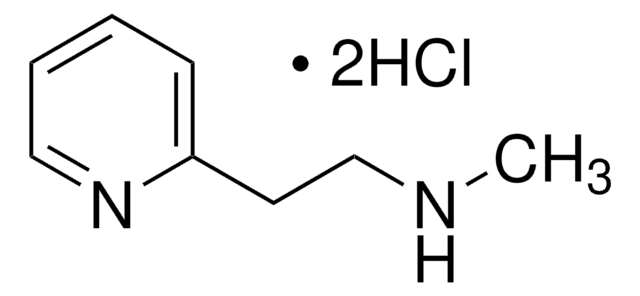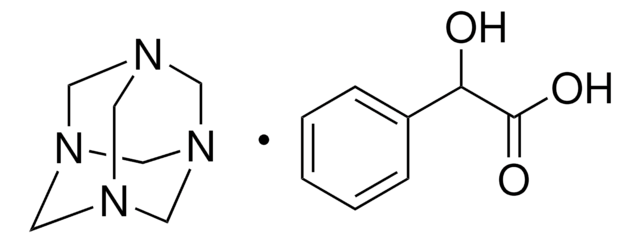SML2641
Methenamine hippurate
≥95% (HPLC)
Synonym(s):
Hexamethylenetetramine monohippurate, 1,3,5,7-Tetraazatricyclo[3.3.1.13,7]decane N-Benzoylglycine, Hippuric acid, compd. with hexamethylenetetramine (1:1)
About This Item
Recommended Products
Assay
≥95% (HPLC)
form
powder
storage condition
desiccated
color
white to beige
solubility
H2O: 2 mg/mL, clear
storage temp.
2-8°C
SMILES string
OC(CNC(C1=CC=CC=C1)=O)=O.N2(CN(C3)C4)CN3CN4C2
InChI
1S/C9H9NO3.C6H12N4/c11-8(12)6-10-9(13)7-4-2-1-3-5-7;1-7-2-9-4-8(1)5-10(3-7)6-9/h1-5H,6H2,(H,10,13)(H,11,12);1-6H2
InChI key
ROAIXOJGRFKICW-UHFFFAOYSA-N
Looking for similar products? Visit Product Comparison Guide
Biochem/physiol Actions
Storage Class Code
11 - Combustible Solids
WGK
WGK 3
Flash Point(F)
Not applicable
Flash Point(C)
Not applicable
Certificates of Analysis (COA)
Search for Certificates of Analysis (COA) by entering the products Lot/Batch Number. Lot and Batch Numbers can be found on a product’s label following the words ‘Lot’ or ‘Batch’.
Already Own This Product?
Find documentation for the products that you have recently purchased in the Document Library.
Our team of scientists has experience in all areas of research including Life Science, Material Science, Chemical Synthesis, Chromatography, Analytical and many others.
Contact Technical Service




